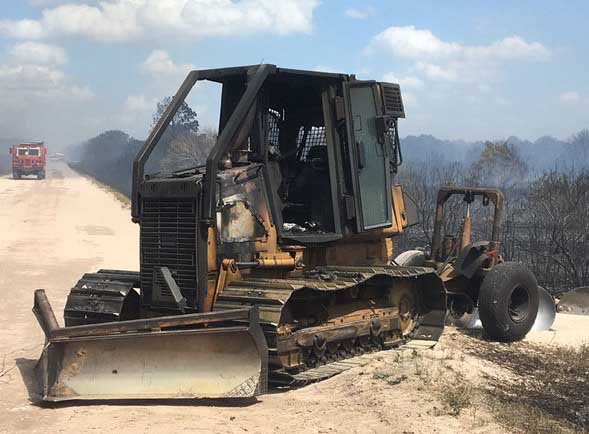
The Florida Forest Service has released a report on the burnover of a dozer that occurred April 16, 2017 in Okeechobee County. As you may remember from our April 17 article, the operator, who was not injured, became entrapped while constructing fire line with the tractor plow and was overrun by the fast-moving fire.
You can read the entire report HERE, but below are some excerpts:
****
Contributing Factors:
- Initial tactics deployed by the first arriving units were based on limited knowledge and experience.
- Incident Commander having minimal initial attack experience.
- Operating equipment beyond its capabilities
- Leaders intent, was not made clear.
- Ineffective transfer of command to experienced leadership positions.
- Loss of situational awareness with crews.
- Lack of effective communication.
- Minimal staffing in Communications Center during high fire danger.
Lessons to Share:
- It is imperative to speak up when you are feeling uneasy, uncomfortable, or unsure.
- Experienced firefighters should be mixed with those who are less experienced. This will necessitate a thorough briefing, ensure instructions are clear and understood and to keep firefighters from working alone when additional units are on scene.
- Personnel accountability is extremely important, especially in complex initial attack circumstances that often require unique tactics and strategies. This helps ensure safety of all crews.
- Operate equipment in appropriate speed settings (1.7-1.9). This will reduce equipment fatigue and failure.
- Turn off air-condition unit if caught in flame front or heavy embers. This will help reduce the likelihood of the filters and cab catching fire.
- Establish properly qualified and experienced leadership.
- Incident Commander should limit his/her hands-on fire suppression activities to maintain effective situational awareness.
- Limit radio traffic to the extent possible. This will improve the possibility that emergency traffic can be transmitted and received successfully.
- Increase staffing in Communications Center on high fire days to help with the additional call volume and radio traffic.
- Know and follow established policy and procedures for emergency radio traffic.
Thanks and a tip of the hat go out to Rob.
Typos or errors, report them HERE.
